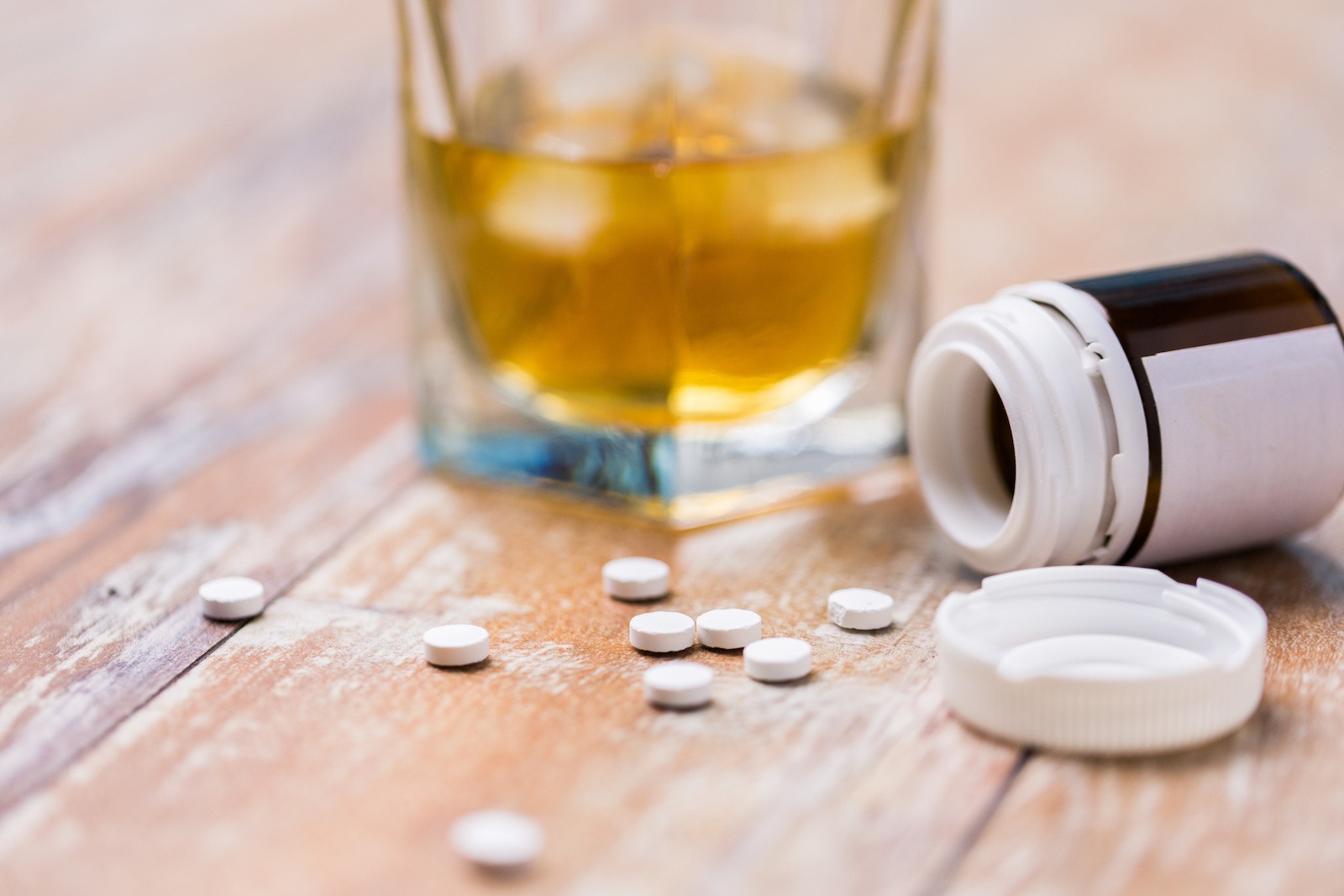Addiction | 6 min read
Xanax And Alcohol: Why It’s Essential To Know The Side-Effects & Dangers Of Mixing Drugs Before You Combine Them
Medically Reviewed By

On September 05, 2022
Written By
On September 5, 2022

When mixing drugs and alcohol, most people know it’s not a good idea. But, one of the problems is that when people think of drugs, they think of illicit and illegal drugs, but they don’t always consider that their prescriptions are drugs too. The only difference is that prescription drugs have a specific use worth the potential side effects and risks of taking the drug.
That can lead to people taking potentially toxic drug combinations, like Xanax and alcohol.
The problem worsens when you consider the casual approach many people have to using alcohol and how common alcohol is in our culture.
Even professional spaces like office parties and meetings with coworkers or potential clients can assume that you’re going to drink alcohol, which can lead to a perception that drinking is safe or pressure people to drink when they shouldn’t.
Xanax and alcohol are a potentially dangerous combination and shouldn’t be taken together. However, sometimes people take them together accidentally and sometimes intentionally, which can be particularly dangerous.
Here’s what you need to know about taking Xanax and alcohol together, the side effects, and why these drugs can be fatally dangerous when taken together.
Xanax And Alcohol Side-Effects
Before we get into why these drugs are dangerous when mixed, it’s important to understand what they are used for and the side effects of each drug.
Xanax is the single most commonly prescribed psychiatric drug in the United States. It’s a benzodiazepine and produces calming effects in users. It can help control various mental health symptoms but is most commonly used to control anxiety.
Xanax works on your central nervous system for most of its effects, which is important because alcohol also affects your central nervous system.
There are a lot of potential side effects from Xanax, though most users have only mild side effects or none.
Side effects can include:
- drowsiness
- lightheadedness
- low energy
- depression
- headache
- confusion
- insomnia
- nervousness
- fainting
- dizziness
- restlessness
- impaired coordination
- irritability
- memory impairment
- anxiety
- decreased libido
- increased libido
- confusion
- muscle twitching and cramps
- chest pain
- hyperventilation
- nasal congestion
- hypotension
- blurred vision
- menstrual disorders
- tinnitus
- upper respiratory infection
- sweating
- weakness
- abnormal dreams
- fear
- increased or decreased appetite
- weight gain or loss
- edema
- slurred speech
- incontinence
If that seems like a long list of side effects, remember that the central nervous system is involved in almost everything your body does. Therefore, medications that affect that system can also affect all those systems.
Again, most people don’t have severe side effects from Xanax and may only have one or two side effects from that list at the proper dose and when Xanax is taken responsibly.
Alcohol might be commonly accepted as a recreational drug, but it also comes with a variety of short and long-term effects, including long-term health consequences.
Side effects from alcohol use include:
- impaired cognition
- impaired movement and reflexes
- sensory alterations
- euphoric or high feelings
- dizziness
- headache
- light sensitivity
- motion sickness
- nausea
- vomiting
- sweating
- weakness
- fatigue
- tiredness
- loss of consciousness
- depression
- anxiety
- blurred vision
- high and low blood pressure
- confusion
- insomnia
- loss of appetite
- weight gain
- weight loss
In addition to those side effects, alcohol use can increase your long-term risk of various conditions.
For instance, your cancer risk increases with alcohol, especially chronic use, binge drinking, or drinking too much in one sitting.
Alcohol use also puts a lot of strain on your liver and kidneys, which can cause problems with other drug use, even if it isn’t a direct problem with your alcohol use.
Additionally, you are at higher risk of heart disease, strokes, and high blood pressure.
The last long-term problem with alcohol use we want to discuss is that chronic and long-term use of alcohol can make your immune system less effective.
The Fatal Dangers Of Mixing Xanax And Alcohol
While Xanax and alcohol are considered safe when used responsibly and in reasonable doses, these medications can have a variety of frightening and potentially fatal interactions when taken together.
One of the reasons that Xanax and alcohol are so dangerous when taken together is that they both work to calm or depress your central nervous system.
That’s why these drugs produce calm, happy feelings in the people who use them.
However, when your central nervous system is too depressed, many issues can be potentially fatal if they aren’t treated immediately.
So why do people mix these two drugs? One of the main reasons is that taking them together can make them both feel better than they do alone, at least temporarily, and in small enough doses.
The problem is that it only takes a very small miscalculation on your dose to have serious consequences, and there’s no safe way to predict how much of each drug you can take reliably.
That’s why people prescribed Xanax are told not to drink simultaneously. It’s not the doctors are trying to keep people from having a good time. They’re just trying to keep people safe.
There are two primary concerns when you mix Xanax and alcohol. The first is that taking the drugs together greatly increases the chances that you will overdose on one or both of them, leading to organ damage, serious side effects, and death.
The other concern is that the two drugs may depress your central nervous system so much that you stop breathing. If your condition isn’t noticed and treated within minutes, this side effect can also be fatal.
If you’re tempted to mix these drugs despite the dangers, that may be a strong indicator that you’re dealing with an addiction, that your mental health disorder is not being adequately managed, or that you are more likely to develop substance use disorders as a result.
Let’s talk a little more about the signs that you’re addicted to Xanax and alcohol or each drug individually.
Are You Addicted To Xanax Or Alcohol?: Some Signs You May Have An Addiction At Hand
If you have a prescription for Xanax and are taking the drug as prescribed, we’re not going to treat that as an addiction, though you may have some of the same symptoms as someone addicted.
Instead, Xanax addiction is typically reserved for people who take more Xanax than prescribed or who take Xanax without a prescription and meet the other requirements to call their condition an addiction.
Substance use disorder often looks very similar regardless of the drug of choice, so we’ll discuss the symptoms of addiction together. You may be dealing with an addiction if you recognize these feelings and symptoms about either Xanax or alcohol.
- You feel anxious or depressed when you aren’t using Xanax/alcohol
- You feel like you need to use Xanax/alcohol to be yourself
- You feel like you need Xanax/alcohol to get through high-stress situations, even when you didn’t need either drug before.
- Your side effects are getting worse, but you’re still taking more Xanax/alcohol
- You feel irritable without Xanax/alcohol
- You get headaches/muscle aches without Xanax/alcohol
- You worry about how you’re going to get more Xanax/alcohol
- You feel like you need to hide your Xanax/alcohol use
- You’ve considered buying Xanax/alcohol from illegal dealers or online pharmacies
- You’ve considered stealing to pay for Xanax/alcohol
- You consistently need to take more Xanax than prescribed
- You feel like you need to shop for doctors to prescribe Xanax
- You become angry or upset when someone wants to talk to you about your Xanax/alcohol use.
Other symptoms of addiction include sudden weight loss and weight gain, drops in productivity, difficulties keeping up at work or school when you didn’t have problems before, and more. However, if the symptoms we’ve already listed sound familiar, you may be dealing with an addiction.
It’s also important to know that just wanting to increase the effects of Xanax or alcohol by taking the other can signify that you’re starting to develop an addiction or that your mental health is worsening. So you need a little extra support right now.
There’s no shame in admitting you’re dealing with an addiction. There is help for you, and you deserve to be supported and helped through recovery.
How To Get Help For An Addiction To Xanax Or Alcohol
The first step to getting help for an addiction to Xanax/alcohol is admitting that what you’re dealing with is an addiction.
After that, you may want to talk to trusted friends and family, let them know what’s going on, and ask for additional support and understanding when and how they can give it. Having a strong support network makes a recovery a lot easier.
The next step is talking to your doctor. If you’re taking Xanax on a prescription, you may need to talk to the prescribing doctor about alternatives and how to stop taking the drug safely.
Both drugs can have relatively serious withdrawal symptoms, so it’s important to have people keep an eye on you while you’re detoxing. In addition, staying hydrated and getting plenty of food is critical during detox.
If you don’t think you can handle detoxing at home or think that a medically assisted detox might be helpful, you should consider reaching out to an addiction treatment center for more help.
Addiction treatment centers may also be more helpful if you’ve already been diagnosed with a mental illness. Additionally, treating addiction and mental illness together can be challenging and requires expertise and compassion from your medical providers.
Are you ready to overcome your addiction?
Contact Ascendant NY. We can help.
Ascendant New York Editorial Guidelines
Here at Ascendant New York, we understand the importance of having access to accurate medical information you can trust, especially when you or a loved one is suffering from addiction. Find out more on our policy.
1. Marshall H. Xanax: Side effects, dosage, uses, interactions, and more. Published August 8, 2022. Accessed August 18, 2022. https://www.medicalnewstoday.com/articles/drugs-xanax
2. National Institute on Alcohol Abuse and Alcoholism. Alcohol’s Effects on the Body | National Institute on Alcohol Abuse and Alcoholism (NIAAA). Accessed August 18, 2022. https://www.niaaa.nih.gov/alcohols-effects-health/alcohols-effects-body
3. Heger E. The terrifying ways mixing Xanax and alcohol may damage your brain and potentially prove fatal. Insider. Published April 22, 2022. Accessed August 18, 2022. https://www.insider.com/guides/health/xanax-and-alcohol





